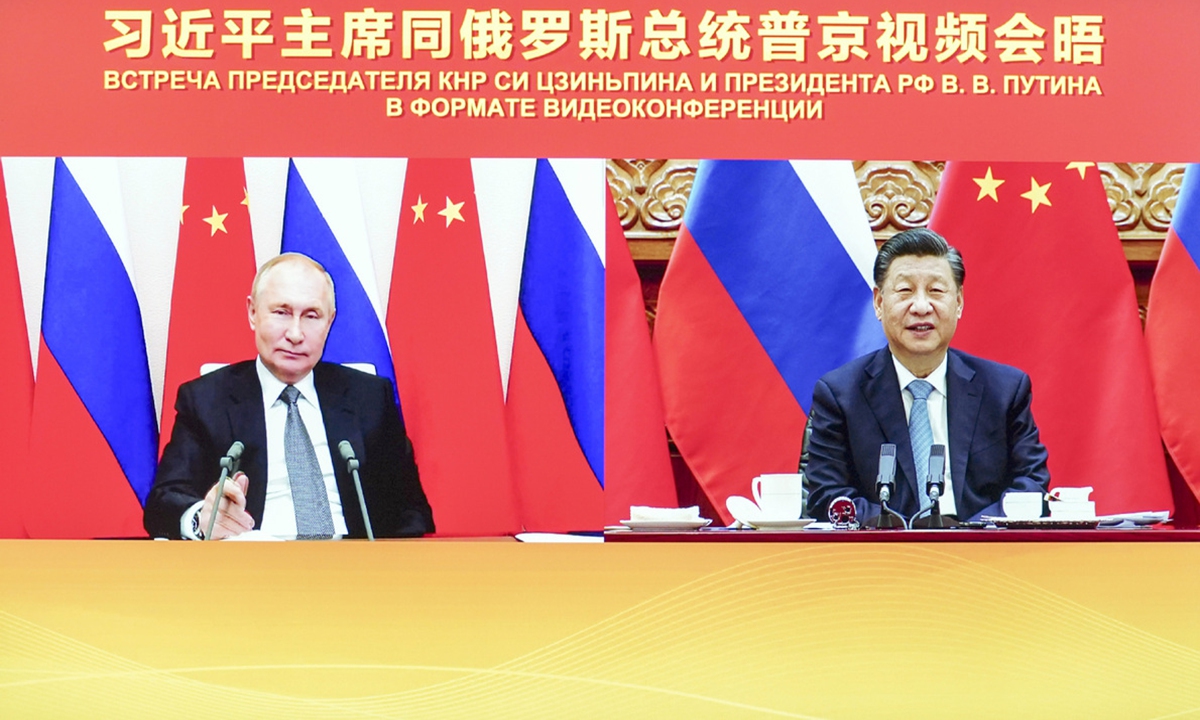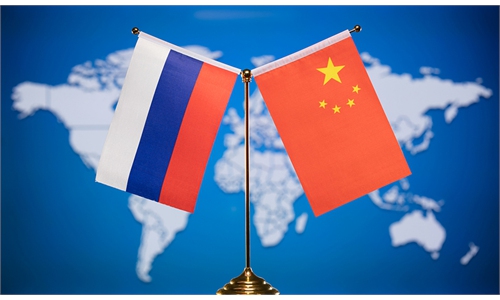US should learn to respect core interests of China, Russia: Global Times editorial

Chinese President Xi Jinping holds a virtual meeting with Russian President Vladimir Putin in Beijing, December 15, 2021. Photo: Xinhua
President Xi Jinping met with Russian President Vladimir Putin via video link on Wednesday afternoon. This is the second time this year that the two leaders held a virtual summit, and the 37th time since 2013. From January to November this year, bilateral trade reached more than 843 billion yuan ($132 billion), which was a 24 percent spike and exceeded trade last year. The prospects of bilateral economic cooperation are encouraging. The two leaders talked about a wide spectrum of topics, and both expressed satisfaction with the current development of China-Russia ties.The readouts from both sides about this summit focused on bilateral relations, and did not mention either "the US" or "the West," both of whom, however, gave enormous attention to this meeting.
The US and the West have recently intensified their threats to Russia and China, portraying them as destructive forces in Ukraine and the Taiwan Straits, and hyping to stay vigilant on China and Russia waging an "invasion." They have piled more military and political pressure, in an attempt to force China and Russia to retreat from their core national interests.
Washington is making the historic mistake of pushing China and Russia too far at the same time. It has overindulged the expansion of egocentrism, and fabricated lies that China and Russia have "broken international rules" and "challenged the international order." It has created strong faith in these lies in the West, forcing itself to engage in dangerous confrontations with China and Russia.
Russia is clearly in overall strategic contraction after the disintegration of the Soviet Union, while China is promoting its peaceful development. The two countries' disputes with the periphery have been triggered by historical factors, and their significance is limited to the local area. Other issues which the US and the West have repeatedly hyped are the internal affairs of China and Russia. The US and the West have maliciously and falsely characterized those issues, solidifying and amplifying the confrontation.
To contain China and Russia simultaneously is arrogant thinking. Although the US has an advantage in terms of strength, it cannot crush either China or Russia. Having a strategic collision with any of the two countries will bring unbearable costs to the US. It's a nightmare for Washington when China and Russia join hands.
It's generally believed that only when Washington has a strong external enemy can its domestic politics function. Otherwise, it will be at a loss as to what to do. But US allies shouldn't be infected with Washington's "obsessive-compulsive disorder" or share the risks of a new cold war.
We must warn individual forces that they are playing with fire when they completely obey the US order or even rely on US power to provoke China and Russia without a bottom line. They'd better not misunderstand the US commitment of protection. Should they cross the red line, punishment will be inevitable, whether they are US allies or not.
After a shameful escape from Afghanistan, the US has been threatening China and Russia over the situation in the Taiwan Straits and Ukraine. However, since the US has never pledged it would send troops in case of a war, those forces provoking China and Russia should be clear that Washington is pushing them to the frontline, while US troops have no intention to stand with them when a war breaks out.
China and Russia have prioritized peaceful development in their national strategies and wish to avoid conflict. The fundamental reason why the US and the West think that China and Russia are trying to "start a war" is that they have pushed them so hard that both countries have to make some response and resistance, regarded by the West as a risky provocation. It is time for the US and the West to try to "step back and meet a broad world."
Threatening and coercing a major power is a bad choice. It is especially unwise when doing so against two major powers. Washington should learn to respect the core interests of the other major powers. The world's superpower should not be obsessed with sheer strength and think it can do anything. This is the key element Washington is required to have and this affects world peace.

